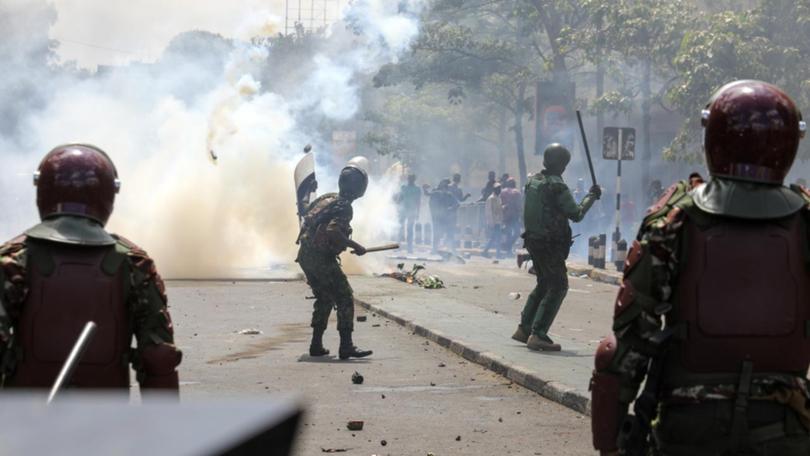Five dead as police open fire on protesters attempting to storm the Kenyan parliament
Several people have died and dozens more have been wounded as police opened fire on demonstrators attempting to storm Kenya's parliament.

Police have opened fire on demonstrators trying to storm Kenya’s parliament, with at least five protesters killed, dozens wounded and sections of the building set ablaze as MPs inside passed legislation to raise taxes.
In chaotic scenes, protesters overwhelmed police and chased them away in an attempt to storm the parliament compound. Flames could be seen coming from inside.
Police opened fire after tear gas and water cannon failed to disperse the crowds.
Sign up to The Nightly's newsletters.
Get the first look at the digital newspaper, curated daily stories and breaking headlines delivered to your inbox.
By continuing you agree to our Terms and Privacy Policy.A Reuters journalist counted the bodies of at least five protesters outside parliament. A paramedic, Vivian Achista, said at least 10 had been shot dead.
Another paramedic, Richard Ngumo, said more than 50 people had been wounded by gunfire. He was lifting two injured protesters into an ambulance outside parliament.
“We want to shut down parliament and every MP should go down and resign,” protestor Davis Tafari, who was trying to enter parliament, told Reuters.
“We will have a new government.”
Protests and clashes also took place in several other cities and towns across the country.
Parliament approved the finance bill, moving it through to a third reading by MPs. The next step is for the legislation to be sent to the president for signing. He can send it back to parliament if he has any objections.
The protesters oppose tax rises in a country already reeling from a cost-of-living crisis, and many are also calling for President William Ruto to step down.
Ruto won an election almost two years ago on a platform of championing Kenya’s working poor but has been caught between the competing demands of lenders such as the International Monetary Fund, which is urging the government to cut deficits to access more funding, and a hard-pressed population.
Kenyans have been struggling to cope with several economic shocks caused by the lingering impact of the COVID-19 pandemic, the war in Ukraine, two consecutive years of droughts and the depreciation of the currency.
The finance bill aims to raise an additional $US2.7 billion ($A4.1 billion) in taxes as part of an effort to lighten the heavy debt load, with interest payments alone consuming 37 per cent of annual revenue.
The government has already made some concessions, promising to scrap proposed new taxes on bread, cooking oil, car ownership and financial transactions. But that has not been enough to satisfy protesters.
Tuesday’s protests began in a festival-like atmosphere but as crowds swelled, police fired tear gas in Nairobi’s Central Business District and the poor neighbourhood of Kibera. Protesters ducked for cover and threw stones at police lines.
People chanted “Ruto must go” and crowds sang in Swahili: “All can be possible without Ruto”. Music played from loudspeakers and protesters waved Kenyan flags and blew whistles in the few hours before the violence escalated.
Police did not respond to Reuters requests for comment.
Thousands had taken to the streets of Nairobi and several other cities during two days of protests last week as an online, youth-led movement gathered momentum.
On Sunday, Ruto praised the protesters, saying they had been peaceful and that the government would engage with them on the way forward. But while protesters initially focused on the finance bill, their demands have broadened to demand Ruto’s resignation.
The opposition declined to participate in the vote in parliament, shouting “reject, reject” when the house went through the items one by one. The bill will then be subjected to a third and final vote by acclamation on the floor of the house.
The finance ministry says amendments would blow a 200 billion Kenyan shilling ($A2.3b) hole in the 2024/25 budget, and compel the government to make spending cuts or raise taxes elsewhere.
“They are budgeting for corruption,” said protester Hussein Ali, 18.
“We won’t relent. It’s the government that is going to back off. Not us.”
